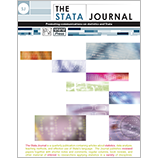Attributable and unattributable risks and fractions and other scenario comparisons
Roger B. Newson
National Heart and Lung Institute
Imperial College London
London, UK
[email protected]
|
Abstract. Scenarios are alternative versions of the same dataset with the same
variables but different observations or values. Applied scientists frequently want
to predict how much good an intervention will do by comparing outcomes from
the same model between different scenarios. Alternatively, they may want to compare
outcomes between different models applied to the same scenario, for instance,
when standardizing statistics from different subpopulations to a common gender
and age distribution. Standard Stata tools for scenario means and comparisons
are margins and pwcompare. A suite of packages is presented for estimating scenario
means and comparisons by using margins, together with normalizing and
variance-stabilizing transformations implemented by using nlcom. margprev estimates
marginal prevalences; marglmean estimates marginal arithmetic means;
regpar estimates the difference between two marginal prevalences (the population
attributable risk); punaf estimates the ratio between two marginal arithmetic
means (the population unattributable fraction); and punafcc estimates a marginal
mean between-scenario risk or hazard ratio for case–control or survival data (also
known as a population unattributable fraction). The population unattributable
fraction and its confidence limits are subtracted from 1 to estimate the population
attributable fraction. Formulas and examples are presented, including an example
from the Global Allergy and Asthma European Network.
View all articles by this author:
Roger B. Newson
View all articles with these keywords:
margprev, marglmean, regpar, punaf, punafcc, margins, nlcom, population, unattributable, attributable, risk, fraction, PAR, PAF, PUF, scenario, comparison, standardization
Download citation: BibTeX RIS
Download citation and abstract: BibTeX RIS
|
